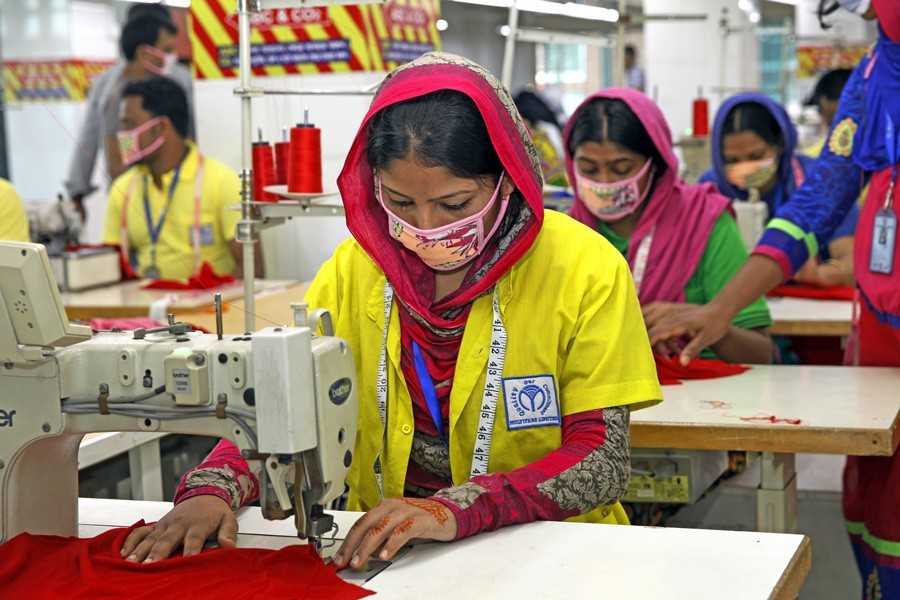Subsequent challenges of Bangladesh's RMG

Image collected
The growth of the country's readymade garments (RMG) sector has been alternatively insignificant during 2016-17 and 2017-18 fiscal years since it grew by 0.2 % and 8.7 % respectively. However, growth level found the following year, because of a depreciating currency and a rise in exports to the United States market.
Bangladesh has greatly benefitted from the united states government's termination of Trans-Pacific Partnership (TPP) agreement with 11 countries -- Australia, Japan, New Zealand, Canada, Mexico, Singapore, Malaysia, Vietnam, Brunei, Chile and Peru. This resulted in a recently imposed tariff on Vietnamese garments, one of Bangladesh's major competitors.
Nevertheless, today Bangladesh's major export-earning industry faces several challenges.
Once Bangladesh graduates to a good middle-income country, it has to wean off from preferential trade benefits such as for example Generalised System of Tastes (GSP) which it really is entitled to in europe market. Loss of price competitiveness will be harmful for the clothing sector. This is a significant trade task for Bangladesh. Another task that awaits this sector is usually evading the low value-low margin market segment creating volume-driven products.
Even so, the sector players absence preparedness for shifting to an increased margin segment and making products with bigger ticket price and developing high fashion products. The Tazreen fashions fire accident and Rana Plaza collapse threatened the RMG sector and credibility of buying garments from Bangladesh possesses been questioned. Approximately 1,500 companies were turn off therefore of failing to adhere to the Accord and Alliance.
A major problem in this sector is sub-contracting. Those apparel corporations currently in procedure need assistance with organisational and recruiting development. The approach towards higher margin apparel segment will be effective since incremental overhead costs will be absorbed and a higher profit margin could be attained.
Still, because of this of the pressure exerted by the Accord and Alliance Bangladesh offers been able to change the perception of the RMG sector among foreign buyers to some extent. On the other hand, the compliance issues have interfered with income. The small and medium enterprises (SMEs) aren't efficient enough and neglect to comply with labor laws and clients' codes of carry out. They fail to mail their shipment promptly and suffer from liquidity crisis and so are unable to pay for worker's wages timely. As a result, they face risk of shedding their businesses. Consequently, there will be a growth in unemployment rates.
On the other hand, the large factories should be able to sustain because they are cost-effective and they match compliance requirements. Some of the productive staff who lose jobs therefore of shutting down of inefficient factories may obtain job in the large factories. This will have spillover benefits throughout the market and help raise sector photograph in importing countries. Whatever the fact that a number of the workers should be able to find their in the past into job in the clothing sector, majority of the personnel will be losing their careers and livelihoods. In this example, the obstacle for the country is to take actions to make sure their inclusive development.
The Bangladesh economy is extremely reliant on the RMG sector for foreign export earnings. A significant challenge that lies in advance is normally hunt and creation of export-oriented sectors, to be able to generate quality careers. It really is high time the united states reduced its dependence on the RMG sector and chosen diversification.
The RMG sector also faces a challenge of retaining a balance with regards to setting minimal wages at a proper level and ensuring the sector's cost competitiveness. As a result, some factories have chosen automation so that you can decrease their dependency on labour. Automation could have undesireable effects on those personnel employed in the RMG industry.
Despite the issues the RMG sector has set a target of $50 billion exports by 2021. This target could be reached if the country grows at an increased price. China will be moving on to high-tech segment from the low one and Bangladesh may take good thing about shifting orders.
The apparent sector can overcome the current challenges by concentrating on inclusive growth. Inclusive progress could be ensured by presenting a strong wage coverage and making timely changes to minimum wages ahead of consultation. This strategy will also help raise competitiveness of the sector and guarantee better sociable protection for garment staff.
Source: https://thefinancialexpress.com.bd
Previous Story
- Export-import with China not hampered up to now:...
- Bonded warehouse, an aid to export diversification
- Has Bangladesh made progress on the rights of...
- Shahriar Alam discusses trade issues with member of...
- Buyers offer Bangladesh lower RMG prices despite rise...
- Sri Lanka plans to set up texture preparing...
- The importance of building relationships in the apparel...
- Shift focus to agro-based industry: BCI